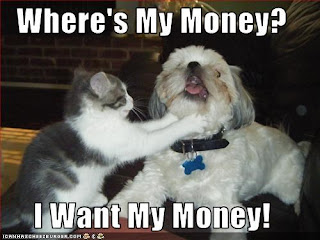There’s an old joke in the music biz: How do you make a small fortune as a musician? Start with a large one. The same can be said for the publishing industry.
In most industries, a worker, be they hourly, salaried, contract, or freelance, makes an agreement with The Boss to do X job for X amount of pay. When the job is done, the check is signed. If you’re an author or a copy writer, things get a little hazy. You may have to sell a certain number of books before you see a dime, or the company with which you signed may be a small start-up with limited capital. Either way, it is incredibly disheartening to see your hard work devalued and dismissed.
“Oh, you want to get paid? Hey, look over there!”
So what do you do if you feel that you’ve been stiffed? There are a number of approaches. Mine involves stomping around the house while grumbling and swearing, followed by downing a few shots of chocolate syrup.
Seriously, though.
You can take the Ralph Kramden Approach: The Nastygram. “You dirty bum, you no-good rat!” While this may temporarily relieve your stress, it rarely produces a positive ending. More often, you’ll get the finger and a reputation in the business for being hard to work with.
Then there’s the Doormat Approach: Do Nothing. “Oh, I’m sure it’s just an oversight. They’ll send that seven months of back pay any day now! I’ll keep working for free and hope they remember soon.” This approach, to be blunt, sucks. While your boss is likely not really a rat, they have More Important Things To Do. If you don’t plan to insist on being paid for your time, you might as well consider yourself a volunteer.
You might try the Firm Approach: I’m Worth It. “I understand that sales aren’t as good as we’d like, but the work has been done for some time and I expect to be paid. I’ll take half now and the rest in installments, and we can continue to enjoy a good working relationship.” Your results may vary. There may be some hemming and hawing before the check arrives, or the check may arrive promptly, accompanied by a pink slip. Either way, you and your boss will both know that you value your time, skills, and effort. Your boss should value those things, too.
The publishing industry is full of interesting tales, and not all of them involve books. The behind-the-scenes stuff can be just as thrilling, shocking, scary, laughable, and irritating as anything found in a bestseller.
What’s your story?






Wow, do I have some stories to tell. Fortunately, the only time I really got stiffed was for a couple of months of work, and I had the satisfaction of seeing the publisher close down. I like to think my wish to "may it come back on you ten-fold" had some sort of cosmic influence.
ReplyDeleteThis whole "starving artist" thing is taken way too literally!
ReplyDeleteSince I own a small publishing company, I always know why I don't get paid for my books. When I work for other publishers or for writers, I have a contract that stipulates when I am paid throughout the process. A down payment is required before the work starts, and incremental payments at specified intervals keep the checks coming. No check, no more work until it's in hand. Do I ever do volunteer work? Of course, but I know at the outset it's a freebie. I can't recall ever being stiffed.
ReplyDeleteGood for you, Linda. Part of the success comes with the initial arrangement. I've never had a bad check, or even slow payment in our fine arts business. We work with a downpayment + due upon installation arrangement there. But publishing can be a bit dicier, with the "carrot" related to book sales. Two things I see fairly often - slow payment to work-for-hires and royalties not being paid in a timely manner.
ReplyDeleteAnd then there was the agent I worked for in Denver who had sales contracts with several publishers. I worked strictly on sales commission because Random House and all their imprints were part of the deal. It took me months to get paid, and then he would take back the accounts I developed for his own. I hope that guy is burning in hell! On the bright side, getting boxes of books as samples every single week was the joy of my life at that point. It was like Christmas every day!
ReplyDeleteHahaha - always love the "I want my two dollars!" paperboy from Better Off Dead.
ReplyDeleteI laugh when I recall the days I thought I'd make thousands of dollars on my first book. I might have broken even by now. On the other hand, I've netted editing, ghostwriting, and coaching clients thanks to my published work, so it has benefited me.
My problem has been that, although I've had terrific publishers, sometimes they've fallen way behind on sending statements. However, when I do get one, it always shows I have not yet made enough sales through them to defray their expenses. (I do a lot of my own sales.) So, they're not cheating me out of anything except knowing how far I still am below zero.
When it comes to newspapers and magazines, I've rarely had problems getting paid. Of course, that process does not require complex royalty calculations.
My most reliable income comes from editing, ghostwriting, and coaching clients. With them, I require a retainer to establish a payment history, then I send invoices and they send checks. No problem.
Yeah, it sounds like the retainer system is a good idea when you do work for hire. I just gave my attorney $2000, and they draw from that as they do work for me. Good enough for them, good enough for anyone. It's the professional way.
ReplyDeleteIndeed. :)
DeleteWhen I set up my website more than a decade ago, I didn't have many options for receiving payments, so I went with the simplest: a PayPal buy button for payment up front. I still promote this option by offering a small discount for full payment in advance. (The only problem is that I usually spend the money faster than I complete the job, so I'm often working hard for no (more) pay. But that's the nature of bills, of course.)
ReplyDeleteI usually work through PayPal too. But I find the cost of their service very high. Don't you?
ReplyDeleteYes. Maybe it's time to look into the alternatives. Someone want to buy me some time? ;-)
DeleteConvenience is a big factor. There's a quote that resonates: "Spend money to save time, because time is money."
DeleteThere's a way to bypass the fees charged. I use PayPal Me.
DeleteI used to do copywriting for a company that thought copywriters were a dime a dozen ... I don't know how they came up with that formula, but they it appears that they were kinda right.
ReplyDeleteAmazon has been a disappointment to me, since they changed their policies about Prime and Kindle Unlimited books, and count the pages, instead of an amount for the books ordered.
ReplyDeleteEven when I worked with a small press for my erotic romances, they paid within 60 days. So I guess I've been lucky. I can't complain about Amazon. Without them I wouldn't be published.
ReplyDelete